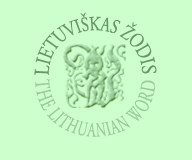Antanas JUŠKA
(Juškevičius) – 1819-1880. Llexicographer and folklorist born
in Daujotai, county of Kaunas on June 4, 1819. Graduating from the
Vilnius Theological Seminary, he wa; ordained in 1843, and served as
curate (and pastor in several parishes, the longest in Veliuona and
Alsėdžiai. He died on Oct. 20, 1880 in Kazan', Russia where he is
buried, his gravestone being inscribed Antonius Juszkiewicz
Letuviensis. Although he never for mally studied philology or
ethnology, he nevertheless distinguished himself in both fields.
Rev. Juška was the
author of a dictionary of the Lithuanian language published by the
Russian Academy of Science in St. Petersburg. Three fascicles 'of the
work entitled Litovskii slovar' were published posthumously in
1897, 1904 and 1922, comprising material up to the word kaštuotis.
The rest remained in manuscript form (see Dictionaries). The work
comprises some 70,000 words, including many, which did not appear in
previously published dictionaries. He gathered words from the living
language spoken in those districts where he lived, especially Veliuona
and Vilkija. To illustrate usage he included whole phrases. The author
translated Lithuanian words into Polish (the letters M, T, 0, R, U, V,
Z, 2 also into Latvian) while his brother Jonas Juška provided
translations into Russian. Initially the work of preparing the
dictionary for publication was undertaken by Jonas Juka and later by a
number of other philologists, Jagic, Fortunatov, Vytautas Juška (the
son of Jonas Juška), Jablonskis, Būga and Šlapelis. The editors
checked the text and changed some details, but the text remained
basically unaltered. Since written Standard Lithuanian in Lithuania
Major was not yet stabilized at that time, the dictionary's
accentuation, phonology, and morphology were based on the dialect of
the author's birthplace, but with some admixture of the other
dialects. The dictionary is especially valuable for its inclusion of
unfamiliar words and their forms, and for its inclusion of expressions
from popular speech.
Rev. Juška also wrote
three unpublished dictionaries, Polish-Lithuanian,
Latvian-Lithuanian-Polish, and Lithuanian-Polish. In 1863 he published
Abecela arba Lementerius (Primer) for children, where he used the
new spelling (e.g., č and š in place of cs and sz).
Another important work
by Juška was a collection of Lithuanian songs. He wrote down about
7,000 folk songs, some 5,000 of them from the district of Veliuona.
The first collection of 33 songs and their Russian translation was
published under the name of Litovskie narodnye pesni
(Lithuanian Folksongs) in St. Petersburg in 1867. Working on the
publication of his extensive collection of songs, Rev. Juška in 1879
went to Kazan’, where his brother Jonas lived. Since the Russian
administration had forbidden the publication of Lithuanian books
employing the Latin alphabet, Professor Baudouin de Courtenay of the
University of Kazan' obtained permission to use Lithuanian orthography
in publication of the songs. Between1880-82 three volumes of the work Lietuviškos
dajnos (Lithuanian Songs) were published,, comprising 1,586 songs.
1883 saw the publication of Lietuviškos svotbinės dajnos
(Lithuanian Wedding Songs), containing 1,111 songs. In 1880 Antanas
Juška also published Svotbinė rėda, a book of Lithuanian
wedding customs. The latter was translated into German, Polish and in
abbreviated form, into Russian. Melodies of folksongs written down in
1852 were published in Cracow in 1900 as Melodje ludowe litewskie
(Melodies of Lithuanian Folks'ongs), edited by Z. Noskowski and
Baudouin de Courtenay. In 1954-55 in Vilnius these works saw second
editions in which the original text was reproduced photographically,
along with a modern transcription. The new edition of Lithuanian
Songs (3 volumes) contains 1,569 s'ongs, while that of Lithuanian
Wedding Songs (2 volumes) contains 1,100 songs and wedding
customs. About 3,000 songs collected by Juska, but never published,
disappeared during World War I.
The songs collected by
Rev. Juška are remarkable for variety of themes and for his novel
method of writing down and classifying the songs. He was the first
Lithuanian to record the names of the singers, giving their social
conditions and the occasion on which each song was sung. He wrote down
the songs in dialect, without changes or omissions, and he classified
some of the songs according to contents. These anthologies are
especially valuable in the study of Lithuanian folklore.
Bibl.: K. Jaunius,
"Apie kun. A. Juškos dainų kalbą," Lietuvių Tauta,
I, Vilnius, 1910; J. Tumas, Lietuvių literatūra rusų raidėmis
ir broliai Juškos-Juškevičiai, Kaunas, 1924; J. Balys, "A
Short Review of the Collection of Lithuanian Folklore," Tautosakos
Darbai, 1, Kaunas, 1935; P. Jonikas, Lietuvių kalbos istorija,
Chicago, 1952; B. Tolutienė, "Antanas
Juška-leksikografas." Literatūra ir kalba, V, Vilnius
1961: V. Biržiška, Aleksandrynas, III, Chicago, 1965.
Text from the ENCYCLOPEDIA
LITUANICA I-VI. Boston, 1970-1978

